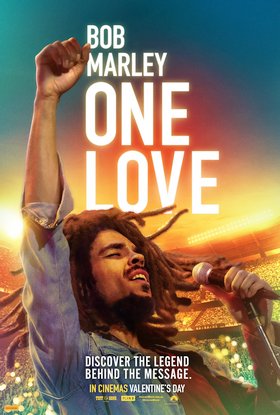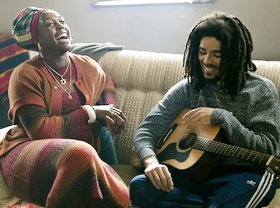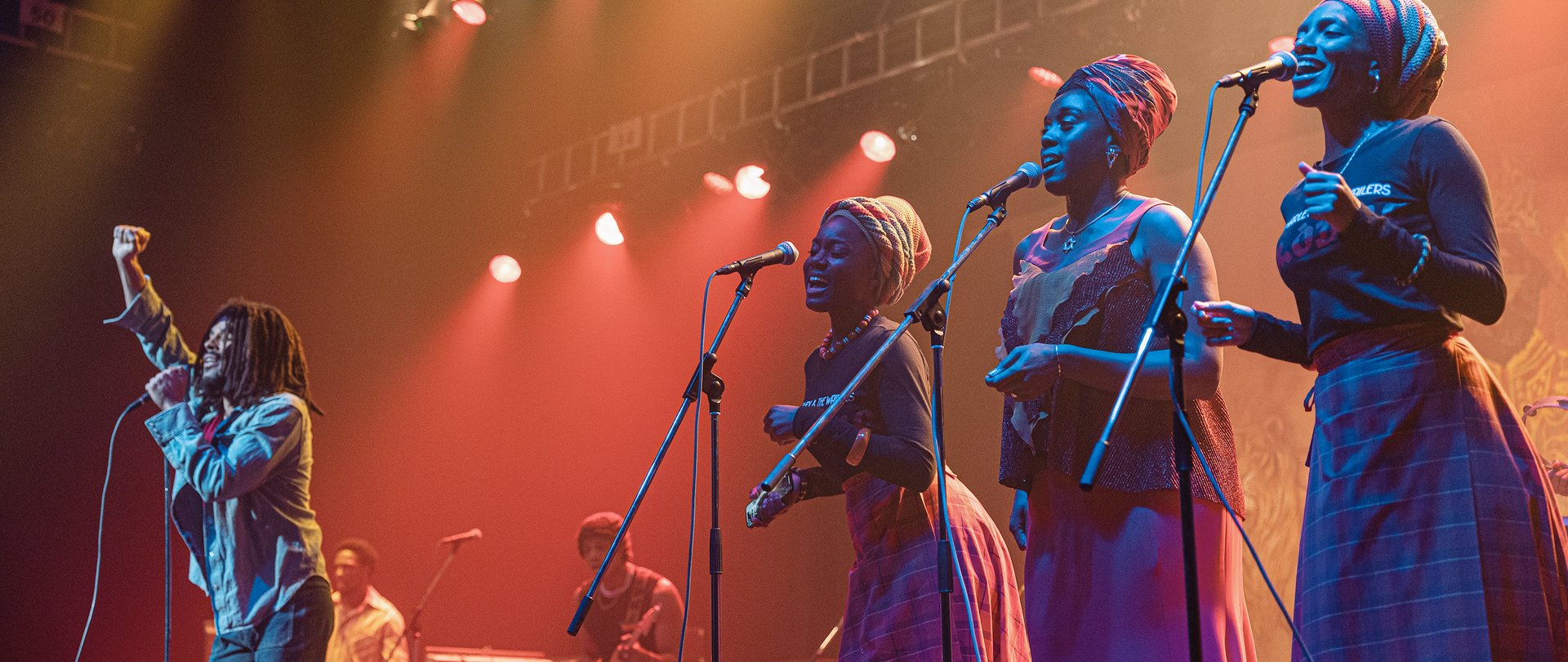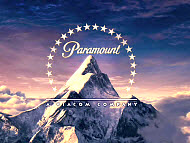Bob Marley: One Love
 for marijuana use and smoking throughout, some violence and brief strong language.
for marijuana use and smoking throughout, some violence and brief strong language.
Reviewed by: Alexander Malsan
CONTRIBUTOR
| Moral Rating: | Very Offensive |
| Moviemaking Quality: |
|
| Primary Audience: | Adults |
| Genre: | Biography Music Drama |
| Length: | 1 hr. 44 min. |
| Year of Release: | 2024 |
| USA Release: |
February 14, 2024 (wide release—3,536 theaters) |




Life in Jamaica, a nation in the Caribbean Sea (its third largest island)
Life of Bob Marley (Robert Nesta Marley) born 1945, died 1981 due to agressive skin cancer
World famous Jamaican reggae pioneer, singer, guitarist, and songwriter
His music fused elements of reggae, ska, and rocksteady
Politically motivated attempt to assassinate (murder) Bob Marley and friends
Frequent use of marijuana
Bob and Rita’s extramarital partners / Infidelity (adultery) in marriage
Attempted blending of Rastafarian empowerment beliefs with the Bible
About MUSIC in the Bible
| Featuring |
|---|
|
Kingsley Ben-Adir … Bob Marley James Norton … Chris Blackwell Lashana Lynch … Rita Marley Michael Gandolfini … Nadine Marshall … Micheal Ward … See all » |
| Director |
|
Reinaldo Marcus Green — “King Richard” (2021) |
| Producer |
|
Rita Marley (wife of Bob Marley) Ziggy Marley (eldest son) Orly Agai Marley (Ziggy’s wife—an Israeli of Iranian descent) Cedella Marley (daughter and director of The Bob Marley Foundation) See all » |
| Distributor |
Bob Marley was always a man who believed in the power of music. If you were to ask the Bob Marley of 1976, for example, you would find a man who would tell you that music has the power to unite people toward a common goal: peace. He’d tell you that music has the power to calm the waters, and in 1976 that is exactly what Bob Marley and his band The Wailers are planning to do.
On the height of Jamaica being freed from Great Britain’s rule, two political parties are at each other’s throats trying to fight for the right to govern the land, The People’s National Party and the Jamaican Labour Party. In the middle of all this, Bob and his promoter decide it’s time to unite the people of Jamaica through a concert, “The Smile Jamaica” concert. Rita, Bob’s wife and backup singer, tells Bob this is a bad idea as it’ll likely put him and his family at risk. Bob being Bob is to set on trying to bring peace to the Jamaican people. But peace is hard to come by.
Just two days before the concert is to be held, several armed men come into Bob’s home and shoot him, his friends and his wife. This leaves a lasting impact on Bob, of course. So much so that Bob decides it is time to leave Jamaica and find his footing in other parts of the world with his music.
Over time though, something keeps nagging in Bob’s mind, “What have I left unfinished back in Jamaica?” “What if my music could do more there?”
After all, music has the power to heal a broken world and whose music brought people together more powerfully than that of the music of one Bob Marley.
If you were to say the name “Bob Marley” everyone would know exactly who you are talking about. People might even include the words “legend,” “Jamaican” and “reggae artist.” If you found a Bob Marley fan, you might even get some very interesting insights into Bob Marley’s actual life and teachings. Wait, teachings?
Yes, I said teachings. Music teaches us things, much like reading and writing. Bob knew this, and he used his love and passion for reggae to listen, reflect, and even question. While the film doesn’t necessarily focus much (though maybe a little) on this portion of his music, Bob’s music did focus on issues, particularly in the earlier years of his career, pertaining to slavery, poverty, crime, equality in rights, etc. However, a lot of music contained more positive and unifying messages, such as “One Love,” “Three Little Birds,” and many others.
“Bob Marley: One Love” takes a rather rose-colored look at Bob’s life and music (apart from attempted assassination at his home and some moments of violence here and there), and in truth I felt that, in the end, I left the theater with a feeling that I was missing something or rather maybe “…One Love” wasn’t what it appeared to be.
At times, the film is a rather beautiful portrait of Bob Marley’s life. But then again, I asked myself “Is this picture almost too perfect? In the film he looks almost like he can do no wrong.” Sure we witness him argue with Rita, but that’s ONE time in the entire 100 minute run time. In the rest of the film he is viewed as, well, as close to perfect as perfect as can be. In reality he had troubles and hardships like the rest of us, but that’s besides the point. I felt like I was getting half the story.
However, where the real caution lies with the film is the promotion of Rastafarianism. It is a well known fact that at a very young age, Bob Marley was a devout Rastafarian. Many Rastafarians believe Haile Selassie is God (even though Haile Selassie was assassinated many years ago (strangled in his bed), but Rastafarians claim his body was never discovered), and that he will return to Africa members of the black community who are living in exile as the result of colonization and the slave trade. For more information please see the Spiritual Issues portion of this review. Those who are new in the Christian faith should be very cautious about seeing “Bob Marley: One Love” for this reason alone, as Bob’s music promoted Rastafarianism and often served as a tool for the Rastafarian religion.
Having said all that, I will say that the film nicely incorporates Bob’s music in the various scenes. The pacing for the film is also fairly solid. Performance-wise, I felt tgat everyone gave a just-average performance—no one that really stood out, overall. The camera work was really well done, particularly the shots of Jamaica. Simply breathtaking.
Issues of Concern
VIOLENCE: Someone is shot and killed in a drive by shooting (offscreen). Characters are shot in an assassination attempt at a home. A character holds a gun on another character in a dream sequence in a few instances. In a dream sequence, a boy is running through a burning field of crops (this sequence appears several times in the film). A male character grabs a female character’s arm to which she pulls away and slaps him. A male character slaps someone’s glass out of their hand, pushes them to the ground then begins kicking and beating him (also hits him with a chair). There is talk of cutting off a toe to stop the progression of cancer. We see Bob’s toe become bloody due to melanoma. A car is set on fire. An officer throws a man against a car. There are conversations about violence and death.
VULGARITY: F*ck (1), Sh*t (1), “Whiteboy,” “Blacky”
PROFANITY: G*d (4)
NUDITY: There are some shirtless males in a couple sequences.
SEX: A couple share some passionate kisses on a bed (the camera pans away before we witness the couple engage in any intercourse).
DRUGS: Bob and several characters are seen smoking marijuana in multiple instances throughout the film. Marijuana is part of the Rastifarian religion.
ALCOHOL: Characters are seen drinking alcohol in several scenes.
WOKEISM: Someone mentions that using words like “you, me, they, them” separate people and that Raska and Rastafarianism is about unity.
OTHER: A Rastafarian preacher believes that God’s skin color is important, laughing at the idea that God could be anything but black. A man reveals that he’s been secretly charging people extra money for Bob’s concerts so that he can pocket the difference. It’s revealed that Bob’s father abandoned him when he was a child.
Spiritual concerns
Rastafarianism plays a role in the film. Rastafarians believe Jesus Christ’s Second Coming occurred through Ethiopian Emperor Haile Selassie I when he rose to power in the 1930s.
Bob desired to spread the Rastafarian message to the world through his music, and he successfully brought it to world attention. He became a Rastafarian icon and infused his music with a sense of its spirituality.
Rastafarians (aka Rastas or Rastafari) have communal meetings typified by music, chanting, discussions, and the smoking of cannabis, the latter regarded as a sacrament. They emphasize what they regard as “living naturally” (harmony with nature), adhering to certain dietary requirements (Ital, similar to that of Jews), not shaving, not cutting their hair (based on Leviticus 21:5), wearing their hair in dreadlocks, and following patriarchal gender roles.
Rastafarianism now reportedly has a presence in many parts of the world, although it originated among impoverished and socially disenfranchised Afro-Jamaican communities in 1930s Jamaica. Its Afrocentric ideology was largely a reaction against Jamaica’s then-dominant British colonial culture. It was influenced by both ETHIOPIANISM and the BACK-TO-AFRICA movement promoted by black nationalists. It focuses on the African diaspora, which it believes is oppressed within Western society, or “Babylon” (Jamaica), and hopes for their return to the Promised Land or “Zion”—particularly Ethiopia in Africa.
Some believe that the Ethiopian Emperor Haile Selassie I (born Lij Tafari Makonnen, died 1975—although some Rastafari believe his death is a hoax) was the reincarnation of Jesus Christ. (Ras is a title and is combined with the name Tafari, making Ras Tafari.) His title at coronation was “The Conquering Lion of the Tribe of Judah.” Hearing of this created a sensation in Jamaica which resulted in Rastafarianism.
Some worship Haile Selassie as God incarnate and call him Jah, viewing him as the messiah who will lead the peoples of Africa and the African diaspora to freedom.
Rita Marley (Bob Marley’s wife and a producer of this film) converted to the Rastafari faith after seeing Emperor Haile Selassie on his Jamaican trip. She says that this is the day when she knew for certain that “the Christ returned.” She claimed in her book No Woman, No Cry that she saw a stigmata print on the palm of his hand as he waved to the crowd, which resembled the markings on Christ’s hands from being nailed to the cross—a claim that was not supported by other sources, but was used as evidence for her and other Rastafari to suggest that Haile Selassie was indeed their messiah.
Rita also wrongly applies Psalm 118:22 to Bob, rather than as a prophecy about Jesus Christ, “The stone that the builders rejected has become the cornerstone” (Mark 12:10-11; Acts 4:11; 1 Peter 2:4-8).
Rastafarianism is both a new religious movement and a social movement. There is no central authority in control and much diversity exists among practitioners. They particularly focus on the Old Testament Hebrew Bible and many believe blacks are truly God’s chosen people.
Learn more about Rastafarianism at CARM (Christian Apologetics and Research Ministry)
Lessons
Bob tried to use music to unite and bring people together in spite of their differences, political or otherwise. While his music had some good messages, as Christians it’s important to remember that it’s easy for something to look like it is from God, and to use discernment and wisdom which can only come through prayer and asking the Almighty.
“Beloved, do not believe every spirit, but test the spirits to see whether they are from God, for many false prophets have gone out into the world.” —1 John 4:1
“Do not be conformed to this world, but be transformed by the renewal of your mind, that by testing you may discern what is the will of God, what is good and acceptable and perfect.” —Romans 12:2
Indeed, something or someone may claim to be for God, but may be against Him.
“This is what the LORD Almighty says: “Do not listen to what the [false] prophets are prophesying to you; they fill you with false hopes. They speak visions from their own minds, not from the mouth of the LORD.” —Jeremiah 23:16
“For false messiahs and false prophets will appear and perform great signs and wonders to deceive, if possible, even the elect.” —Matthew 24:24
So how should we act as Christians?
Beloved, do not believe every spirit, but test the spirits to see whether they are from God, for many false prophets have gone out into the world. By this you will know the Spirit of God: every spirit that confesses that Jesus Christ has come in the flesh is from God, and every spirit that does not confess Jesus is not from God. —1 John 4:1-3
Conclusion
I’m absolutely dumbfounded when it comes to “Bob Marley: One Love,” which might actually be a first for me. This is one of those films that begs me to ask the question, “Why isn’t the whole picture being presented?” I mean, if Ziggy Marley (Bob Marley’s son) produced this film (as did some of his other family members) then why aren’t we seeing EVERYTHING about Bob Marley: the good, the bad AND the ugly? I wanted to understand a little more about why Bob focused so much of his musical attention on Reggae music? I wanted to understand Bob’s relationship with the Reggae and how his love of Reggae influenced his decision to do the “Smile Jamaica” and the “One Love” concerts.
While I understand Bob’s beliefs in Rastafarianism were central to a lot of his music, the film itself seemed like an advertisement not just for Bob, but for Rastafarianism, and that’s dangerous for Christians new in the faith. So with that, combined with the enormous amount of use of marijuana on screen, sequences of violence, and some sexual content, I am going to have to say that audiences should steer clear of “Bob Marley: One Love.” Find something else.
- Drugs/Alcohol: Heavy
- Wokeism: Moderately Heavy
- Violence: Moderate
- Vulgar/Crude language: Moderate
- Profane language: Mild
- Nudity: Mild
- Sex: Mild
- Occult: None
See list of Relevant Issues—questions-and-answers.


PLEASE share your observations and insights to be posted here.

